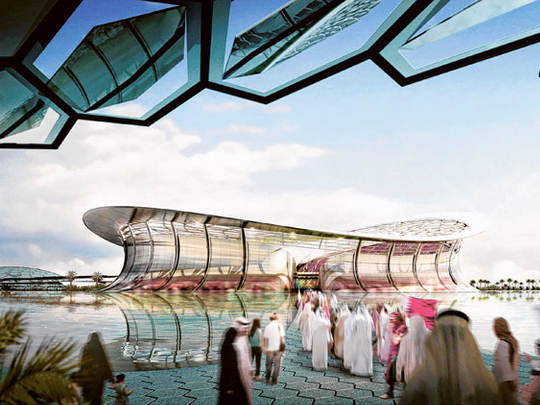
After the euphoria created by the news of Qatar's successful 2022 Fifa World Cup bid and the high expectations of a bounty of benefits, reality may have started to sink in.
While holding opposing views on whether Qatar will benefit or not, economists are raising several questions and putting forward several scenarios. They differ about to what extent Doha will benefit and what the possible risks ahead are.
Undoubtedly, one side argues, hosting the first World Cup in the Middle East is "hugely positive" for the booming oil- and gas-rich country as well as the rest of the Arab region socially and politically.
Others caution that the economic windfall the World Cup will bring to the country could be less than previously expected. They don't rule out the possibility, in financial terms, that Doha could end up paying more than what it will get.
"In short, Qatar is the chosen face of the new Arab world: rich, bold, futuristic," wrote Farouk Soussa, chief economist for the Middle East at Citibank, in a paper on the econ-omic perspective for Qatar hosting the World Cup.
From a "PR perspective there can be no doubt that the World Cup will heap immense benefits on the region and the swell of pride is justified", he continued.
However, "great expectations of the econ-omic benefits that the Cup will bring may not be fully justified, in our view", Soussa added in the paper, a copy of which was obtained by Gulf News.
But some other financial experts differ with Soussa.
"The cost-benefit of the 2022 World Cup should not be measured only in terms of money for Qatar. The social, cultural and perceptional value of this iconic event is much more than direct money value for Qatar, the Middle East and the whole Muslim world. This is for the first time such an event is happening in the Middle East and in a Muslim country," said Iftekhar Ahmad, financial officer with Ali Bin Ali Group, one of the largest retail and distribution companies in Doha.
Among the benefits of holding such a big event is that it would "help remove many wrong perceptions some people may have about the region", Ahmad told Gulf News.
The arrival of many tourists, journalists, and sports and business people from around the world to Qatar and the region would lead to a social and cultural transformation that would later bring financial and non-financial benefits to Qatar and the region, including a better understanding of the Muslim heritage, culture and values, he added.
When Fifa announced its decision on Dec-ember 2 that Qatar would host the 2022 World Cup, the region's markets immediately reacted favourably. Doha's equity market rose 7.5 per cent.
The region's markets were also swift to react in the first few days, with the share prices of several companies, mainly those involved in construction, climbing amid high expectations of a significant bonus from the billions of dollars the Qatari government has pledged to spend on the games.
A good slice
Several companies in neighbouring countries are hoping to get a good slice of the pie.
Many economists endorsed this enthusiasm that Doha plans to generate between Qatar and its Gulf neighbours through rail and road projects.
Foreign companies are also eyeing potential projects in Qatar as the country starts looking around for the best expertise in various fields.
Last month, Shaikh Hamad Bin Khalifa Al Thani, the Emir of Qatar, visited Austria and held talks with President Heinz Fischer.
The two countries signed an agreement on double taxation and air transport which Austrian officials said was "important" in the light of planned Austrian investments in the Fifa World Cup 11 years later.
People involved in the talks said that Qatar was also seeking Austrian know-how in tourism management during the event.
The tax agreement ensures that income and capital are not taxed twice. The agreement on air traffic provides the basis for future negotiations on, among other things, the number of flights between the two countries, the Austrian president's office said.
Some economists expressed their reservations about over-optimism.
Quoting several studies on the economic impact a country or a city can expect by hosting an international sporting event, Soussa said: "The results are generally not very encouraging for Qatar.
Though the impact varies from one study to another, and from case to case, he noted, there were general lessons that could be drawn. For example, the cost of hosting such an event often outweighs the benefits. Also, the benefits are more likely to be outweighed by the costs in developing countries, which must put the infrastructure in place to host the event.
In principle, the economic benefits accrue to the host nation from investment in productive infrastructure in the build-up to the games, opportunities for local companies in developing the infrastructure, boosting tourism and related industries such as airlines.
Then there's the multiplier effect, where all other factors will result in secondary expenditure in the economy as employment increases and residents experience a wealth effect, noted economists.
But in practice, the situation with oil- and gas-rich Qatar seems to be different, and was likely to be "modest", Soussa said.
"We see the benefits in Qatar's case as being limited by the following factors: the actual spend on World Cup-specific infrastructure is going to be far less than the reported $50 billion (Dh183.9 billion) plus," the Citibank economist added.
Actual spending on World Cup-specific infrastructure is a drop in the ocean compared with projects currently going on in Qatar, he said. Also, "the beneficiaries of increased expenditure on the World Cup will largely be foreigners, with little valued added remaining in Qatar."
A large chunk of the construction is expected to be focused on building new stadiums and supporting infrastructure, and expanding hotel capacity beyond what has already been planned in order to accommodate the expected inflow of guests in 2022.
Already, Doha's ongoing plan to develop its infrastructure is ambitious. The plan in place is not related to the World Cup. It is estimated that there are nearly $150-billion worth of real estate and infrastructure projects under way in Qatar.
Rail network
For example, Qatar has an ongoing $15-billion plan to upgrade the airport in Doha.
The planned rail network crisscrossing Qatar and leading to other GCC countries is estimated to cost $25 billion and be developed over the next six to seven years. Also, Doha plans to spend nearly $20 billion on the road network including the Bahrain-Qatar causeway — once completed, it is expected to bring Bahrain as close as 90 minutes' drive from Doha — and another $5 billion project to build Doha port, economists added.
As for tourism infrastructure, 118 new hotels were being built by the end of 2009, raising the current capacity of 8,500 hotel rooms to nearly 22,000, according to the Qatar Tourism Authority.
Yet Qatar needs triple the planned number of hotel rooms in case the number of fans visiting Qatar equals the 309,000 people who went to South Africa for the 2010 World Cup and stayed for an average of almost 18 nights.
This is where Qatar's neighbours would receive part of the big numbers of football fans.
Other sectors expected to benefit from the World Cup in Doha include retail trade, construction, real estate and banking.
Yet some economists believe a large part of the benefits from the anticipated construction boom will accrue to foreigners and will not stay within the Qatari economy. Most of the new jobs will be taken up by foreigners. Foreign contracting companies will carry out the building using imported materials, they said.
Foreign hotel franchises will benefit from the higher occupancy rates. As the Citibank economist said, there are no domestic taxes to "capture the gain".
Qatar's private sector has already set up a panel to lobby with the government to ensure that local companies have the lion's share of the lucrative development projects linked to the 2022 event.
It will be headed by Shaikh Khalifa Bin Jasem Al Thani, chairman of the Qatar Chamber of Commerce and Industry (QCCI).
"We want all major contracts whether in civic or sports infrastructure to come to Qatari companies. We are competent enough to deliver," a source in the QCCI told the Qatari English-language daily The Peninsula.
The panel will keep in close touch with ministries, government agencies and officials concerned with evolving and awarding of the development projects related to the 2022 World Cup, the paper added.
"The development work needs to be well coordinated and planned in order to avoid over-enthusiasm and falling into real estate and construction overkill. If supply is not monitored properly, this can create a bubble and harm the investors," Ahmad said.
Moreover, there are those who believe Qatari banks stand to benefit from the event through higher credit demand in the next 12 years to fund the projects, contracting and subcontracting.
Risks under control
Qatar's total banking assets amounted $129.4 billion at the end of 2009 — representing approximately 130 per cent of Qatar's GDP, a ratio that remains low compared to other developed markets.
"As banks participate in the financing of these infrastructure developments and other projects required for the 2022 World Cup, we expect risks to remain under control as the government would typically tender such projects to private companies but secure the cashflows of the loans.
"While interest rate spreads are typically lower for such loans, higher business volumes will compensate for lower margins and contribute to banks' revenue growth," said a report by Moody's, a prominent credit rating agency.
"Nonetheless, a key challenge for the Qatari banks going forward will be to secure longer-term funding in order to finance such longer-term projects. To this end, we expect that higher market issuance in the international markets will be needed to attract longer-term funding and address any maturity mismatches on banks' balance sheets," it added.













